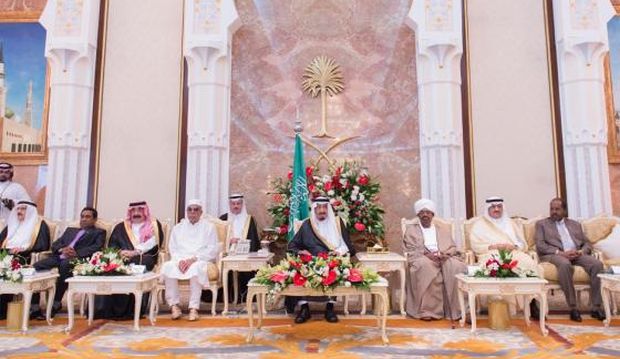
Saudi Crown Prince Salman (C) with Sudan’s President Omar Al-Bashir, Somali President Hassan Sheikh Mahmoud, President Abdel Hamid of Bangladesh, Prince Talal bin Abdulaziz bin Saud and Prince Khalid bin Bandar bin Abdulaziz, Chief of General Intelligence (SPA)
“We will not rest until we eradicate this phenomenon [terrorism and religious extremism] and this group [terrorist or extremist groups] which has strayed from the path and which has used the Islamic religion as a bridge to cross in order to get to its own personal goals,” King Abdullah said, in a speech addressed to the Islamic world and given on his behalf by Deputy Prime Minister and Defense Minister Crown Prince Salman Bin Abdulaziz at a gathering of Muslim leaders in Mina to mark this year’s Hajj pilgrimage.
He added: “This needs concerted efforts from all of us to fight and defeat [terrorism and religious extremism] . . . It is like a diseased organ; the only way to defeat it is to amputate it. We are striving without rest to eradicate it with help from the Almighty.”
King Abdullah also stressed the importance of tackling the root causes of terrorism by taking aim at extremist thought. He urged educators to strive to inculcate the concept of “dialogue” between cultures, adding that it was “only through dialogue” that different peoples around the globe could live together and cooperate.
“[Dialogue] stems the flow of blood and rejects sectarianism, ignorance and extremism; it allows peace to prevail around our world . . . [Teachers] must prepare their students for living in a way that accepts the ‘other,’ to debate with them in the best way possible. The educational curriculum is a suitable environment for making the student familiar with dialogue, and that any disagreement can be solved with dialogue and debate.”
King Abdullah also called on religious leaders to play their role in tackling the root causes of extremism and terrorism, stressing that they must provide young people with the “best examples of how to engage in dialogue [with other people and cultures] and how to treat them [well],” and show the rest of the Islamic global community “what the Islamic religion includes in terms of mercy and moderation.”
Meanwhile, authorities in the Kingdom are readying for the end of the Hajj pilgrimage, when millions of visitors will be returning to their home destinations after completing the ritual. Authorities expect some 1.5 million pilgrims to leave the country on Monday.
